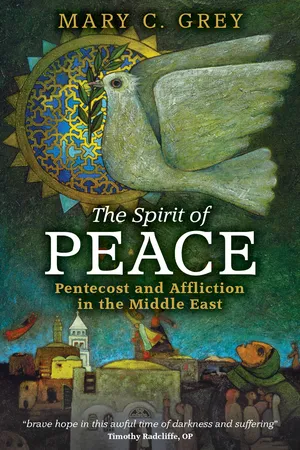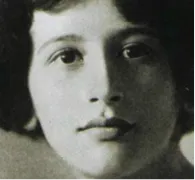
- English
- ePUB (mobile friendly)
- Available on iOS & Android
About this book
Whatever happened to the Arab Spring?
Not long ago there was the dawn of a vision of peace and justice in the Middle East. Just a few years later that vision seems to have vanished and instead there has been a renewal of new threats of violence between certain Middle Eastern peoples, especially against Middle Eastern Christians. In this book, Mary Grey asks how the Holy Spirit is leading us to a new future, for all these people: Christians, Jews and Muslims. God's outpouring Spirit must be seen as the power of resistance to evil. Pentecost lifts up the renewed hope that ever promises new energy for justice and peace.
"Mary Grey dares to look closely at the appalling affliction of the Middle East today, and there find signs of the Holy Spirit at work: enduring, healing, reconciling, and imagining a new peace. She offers us brave hope in this awful time of darkness and suffering."
— Fr Timothy Radcliffe, OP
Author; Director, Las Casas Institute, Blackfriars Oxford
"In a deeply inspiring way, Mary Grey explores the journey of the Spirit alongside struggling people through their affliction. She traces the multiple dimensions of the Spirit in the Gospel story as well as in contemporary times. A journey of hope towards peace."
— The Revd Dr Naim Ateek
Founder, Sabeel Ecumenical Liberation Theology Center, Jerusalem
"The Spirit of Peace is an inspirational and courageous work, written with immense care and a clear love of the Middle East. Mary Grey's emphasis on the role of the Holy Spirit reveals a crucial dimension of faith dynamics in the Middle East. In that part of the world, we desperately need the work of the Holy Spirit to enlighten and inspire us so that we may understand our history better, face our challenges, and build a future where Christianity can continue to be a beacon of the love of God in the birthplace of our faith."
— The Revd Nadim Nassar
Director & co-founder, The Awareness Foundation, London
"In The Spirit of Peace Mary Grey has done what few Christian theologians in the West have dared to do: to apply the insights of Christian Liberation theology to the suffering of so many people in the contemporary Middle East. In so doing, she reminds us of the powerful contemporary relevance of this approach to Christianity and challenges people of all faiths and none to really allow in to our hearts and our consciousness both the suffering and the ground for hope in what is sometimes dismissed as an intractable problem."
— Rabbi Michael Lerner
Chair, Network of Spiritual Progressives, and Editor, Tikkun magazine
Frequently asked questions
- Essential is ideal for learners and professionals who enjoy exploring a wide range of subjects. Access the Essential Library with 800,000+ trusted titles and best-sellers across business, personal growth, and the humanities. Includes unlimited reading time and Standard Read Aloud voice.
- Complete: Perfect for advanced learners and researchers needing full, unrestricted access. Unlock 1.4M+ books across hundreds of subjects, including academic and specialized titles. The Complete Plan also includes advanced features like Premium Read Aloud and Research Assistant.
Please note we cannot support devices running on iOS 13 and Android 7 or earlier. Learn more about using the app.
Information
Doing theology in Ayacucho: forsakenness and affliction as themes for Christian theology in the Middle East
As I worked in the factory, indistinguishable to all eyes, including my own, the affliction of others entered into my flesh and my soul . . .In the realm of suffering, affliction is something apart, specific and irreducible . . . It takes possession of the soul and marks it through and through with its own particular mark, the mark of slavery.Simone Weil [13]
Is it possible to talk about a God who wants justice in a situation of poverty and oppression? How can the God of life be proclaimed to people who are suffering premature and unjust death? . . . What language can be found to tell those who are not seen as integral persons that they are sons and daughters of God? [15]
Affliction as starting point for the Middle-Eastern context

The great enigma of human life is not suffering but affliction. It is not surprising that the innocent are killed, tortured, driven from their country, made destitute or reduced to slavery, imprisoned in camps or cells, since there are criminals to perform such actions. It is not surprising that disease is the cause of long sufferings, which paralyse life and make it into an image of death . . . But it is surprising that God should have given affliction the power to seize the very souls of the innocent and to take possession of them as their sovereign lord. [20]
. . . Because, like a red-hot iron it stamps the soul to its very depths with the disgust and even the very self-hatred and sense of guilt and defilement which crime logically should produce but actually does not. [21]
The wicked move boundary marks away,
They carry off flock and shepherd.
They drive away the orphan’s donkey,
As security they seize the widow’s ox.
The needy have to keep out of the way,
Poor country people have to keep out of sight.
Like wild desert donkeys, they go out to work,
Searching from dawn for food,
And at evening for something on which to feed their children. [24]
Some years ago, J. B. Metz, with great human and Christian sensitivity, asked how God could possibly be discussed after the horrendous experience of Auschwitz. Centuries ago, Bartolomé de los Casas stated that he had seen Christ scourged a thousand times in the Indians of Latin America; in the same context, I ask how God can be discussed not after but during Ayacucho! The question undoubtedly implies more than our capacity to reply. [26]
The categorical refusal of the Israelis to acknowledge the Nakba and their absolute unwillingness to be held accountable, legally and morally, for the ethnic cleansing they committed in 1948. [31]
You may kill as many people as you want, but you cannot kill their memory. Memory is the most invisible and resistant material you can find on earth. You cannot cut it like a diamond, you cannot shoot at it, because you cannot see it; nevertheless it is everywhere, all around you, in the silence, unspoken suffering, whispers and absent looks. [33]
Palestinian sumud —a source of strength for an afflicted people.
- The spirituality of sumud brings together many of the aspects of a praxis of justice and reconciliation: beginning in the experience of affliction, it is nonetheless situated in relational theology seeking justice and peace. Spirituality in its simplest meaning is the life of the Spirit, embracing the human spirit, the human zeitgeist (spirit of the times), the energy grounding hope, itself linking with the Divine, the Universal Spirit of life that is shared by all faiths. But the meaning of spirit that unites a struggling people in the most literal way is the Spirit as breath of life grounding hope.
- Taking a deep breath in this Dark Night of the Palestinian people, and of many peoples in the Middle East, means, firstly, connecting with this spirit, calling on resources for the long haul, refusing to give way to the suffocating effects of daily humiliation. [35] Drawing deep on the Spirit, the breath of life, is keeping hope alive.
Table of contents
- Preface
- Introduction: Whatever happened to the Arab Spring? The threatened situation of Christians in the Middle East.
- 1. Doing theology in Ayacucho: forsakenness and affliction as themes for Christian theology in the Middle East
- 2. Gaza in history and in contemporary reality
- 3. Syria, the Arab world’s broken heart
- 4. Out of Egypt have I called my son
- 5. Breaking the impasse I: The Holy Spirit as bridge-building and creating dialogue.
- 6. Breaking the impasse II: The experience of women and the Holy Spirit as beauty
- 7. From old Jaffa to Caesarea—the Spirit leads into the future!
- Bibliography
- Notes